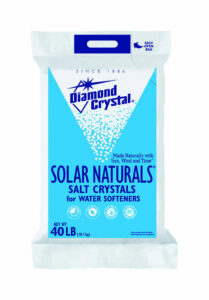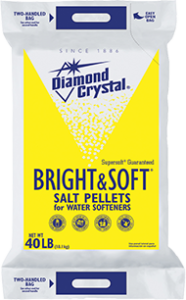A significant portion of your salt-based water softener’s regular maintenance involves replenishing the salt. These particular systems replenish the sodium-charged resin beads, which are crucial to the water softening process, by washing away the hardness minerals with a brine solution.
You must immediately refill your brine tank if you detect that the salt level is getting low. Common salts used in water softener systems include crystals, salt pellets, and potassium chloride. However, which one do you pick?
Potassium chloride pellets or salt pellets? Salt pellets produced from solar or evaporation? Our article today will discuss the best salt for water softeners available in the market as well as what you need to consider when choosing the best salt.
Reviews – Best Water Softener Salt Options of 2024
Morton Clean & Protect Salt: Top Overall Salt For Water Softener

- Type: Evaporated salt pellets
- Weight: 50 lbs.
- Usage: 2-4 bags/month
The Morton Clean & Protect is, in our opinion, the greatest water softener salt currently on the market. Clean Protect by Morton Salt pellets embodies the goodness of nature. It is a naturally produced water softener that contains a lot of pelletized high-quality crystals.
The evaporated salt pellets are more effective than the majority of other water softener salts on the market because of its exceptionally high purity (99.8%). Additionally, it aids in the lifespan extension of your electric water heaters.
Additionally, it offers great value for money at just over $6 for each 40-pound bag. The Clean & Protect is the flagship product from Morton, one of the main producers of water softener salt pellets.
This evaporated salt is a one-stop shop for getting rid of the minerals in hard water, and it comes highly recommended by softener manufacturers like Northstar and Kenmore.
Pros
- Stop the buildup of minerals. The evaporated salt pellets offered 100% effective softening right away when we used it to treat water that was harder than typical.
- Simple to carry and manage.
- Cleans the water softener by leaving the least amount of debris and residue.
- Highest level of purity.
- 40 pounds of salt pellets costs just over $6. An average family of four requires one bag each month, which comes to a cost of $72 annually.
Cons
- Regular mixing with softener is required.
Morton Clean & Protect Rust Defense: Great For Iron Laced Water

- Type: Evaporated salt pellets
- Weight: 40 lbs.
- Usage: 2 bags/month
We believe that Morton Clean and Protect Rust Defense is the best for Iron Laced Water. For those who are serious about utilizing the purest, cleansed, most natural water softener salts, this evaporated salt is a better option than our top two Morton products since it is manufactured from all-natural, high-purity salt crystals that include no additives.
Regarding the type of salt used in the Pure and Natural product, there are conflicting reports. Although solar salt pellets are probably the most plausible candidate, each bag of salt pellets contains high-purity sodium chloride crystals.
The Pure and Natural evaporated salt pellets, like Morton’s Clean & Protect, prolongs the life of appliances, lessens scale development, lessens skin and hair dryness, and decreases your cleaning chores.
Again, when you purchase Pure and Natural, you receive 40 pounds of water softener salt pellets every bag. Depending on the size of your household and the hardness of your water, you’ll need to add 1-4 bags of salt to your softener each month.
Pros
- Pure and Natural salt performs about as well as the Clean & Protect in terms of how well it dissolves in water and how little filth it leaves behind in the salt tank.
- The water softener salt was immediately effective at softening even very hard water.
- All-natural evaporated salt has the advantage of leaving behind no contaminants that can block the brine tank. You may not need to clean the brine tank for at least a year due to its high purity and all-natural construction.
Cons
- This Morton evaporated salt gives the same purity rate (99.8%) as the Morton Clean & Protect, the extra $2 per bag may be difficult to justify even though it may be pure, clean, and additive-free.
Morton Pure and Natural Softener Salt

- Type: High-purity salt crystals
- Weight: 40 lbs
- Usage: 3-4 bags/2months
We believe that Morton Pure and Natural is the best natural water softener salt available. The natural construction of Morton Pure and Natural Water Softening Crystals is something they take great pleasure in. The superior salt crystals in this water softener salt are well-known.
For those who are serious about utilising the purest, cleansed, most natural water softener salts, this water softener salt is a better option than our top two Morton products since it is manufactured from all-natural, high-purity salt crystals that include no additives.
Major companies like Whirlpool and Northstar endorse it. You can be confident of its superior quality because it also helps to raise the standard of water.
Again, when you purchase Pure and Natural, you receive 40 pounds of water softener salt every bag. Depending on the size of your household and the hardness of your water, you’ll need to add 1-4 bags of salt to your softener each month.
The Pure and Natural salt, like Morton’s Clean & Protect, prolongs the life of appliances, lessens scale development, lessens skin and hair dryness, and decreases your cleaning chores.
Pros
- Simple to handle
- Robust packaging
- Applicable to all water softeners
- Increases the longevity of your appliances
Cons
- This Morton salt gives the same purity rate (99.8%) as the Morton Clean & Protect, the extra $2 per bag may be difficult to justify even though it may be pure, clean, and additive-free.
- Regular mixing with softener is required.
Diamond Crystal Solar Naturals

- Type: All-natural solar salt
- Weight: 50 lbs
Are you looking for a water softener salt that is affordable? You’ve found it! The Diamond Crystals water softener salt is produced via an environmentally friendly manufacturing process using solar energy and contains a variety of natural ingredients. Diamond Crystal, a well-known supplier of high-purity, quickly soluble, naturally occurring salt products.
The salt in Diamond Crystal Solar Naturals is entirely additive-free because it is produced by drying seawater in the wind and sun. Considering that it can lessen brine tank residue, this water softener salt is a must. It may lengthen the lifespan of your appliances as well.
This solar salt is offered in huge 20-kilogram bags, as well as 25, 40, and 50-pound bags, depending on where you get it. The value increases with the size of the bag.
Pros
- Extremely soluble
- Pure sodium chloride crystals.
- Applicable to all water softeners
- Resists mushing and bridging
Cons
- Might result in salt bridges
- Although only by 0.2%, the 99.6% purity of the Diamond Crystal Solar Naturals is less than that of the top Morton rivals.
Diamond Crystal Bright & Soft: Excellent High Purity Salt Pellets For Water Softener

- Type: Compacted water softener salt pellets
- Weight: 50 lbs
- Usage: 1 bag/month
For the greatest high-purity water softener salt, the Morton Clean & Protect comes out on top, followed by the Diamond Crystal Bright & Soft. This Diamond Crystal salt product, which competes with Morton, is 99.8% pure salt and costs roughly $6.20 for a 40-pound bag.
In order to avoid mushing and bridging, this kind of water softener salt—pellets rather than crystals—is advised for water softeners with small or single tanks or heavy water demand. In terms of the security and compatibility of drinking water treatment chemicals, this Diamond Crystal salt is NSF/ANSI/CAN 60 certified.
While there was little performance difference between Morton Clean & Protect and Diamond Crystal Bright & Soft, we did find that the Diamond Crystal salt didn’t dissolve as effectively and had more inconsistent consumer feedback.
Pros:
- In our testing for dissolving and cleaning, the Diamond Crystal Bright & Soft performed better than we had anticipated. Despite taking longer than Morton Clean & Protect salt, the salt entirely dissolved in water, and because of its high purity, you won’t need to clean the brine tank as regularly.
- Salt pellets have two advantages over salt crystals: they may be introduced directly to your salt-based water softener without having to be ground into a small powder, and they dissolve more gradually, making them more suited for all-in-one water softeners.
- The $6.20 price tag for a 40-pound bag cannot be criticised. Additionally, some shops provide larger (up to 20 kg) and smaller (down to 25 kg) bags, allowing you to shop according on your budget.
Cons:
- In contrast to softeners with separate brine and resin tanks, these water softener salt pellets don’t dissolve as quickly as salt crystals, which is perfect for all-in-one softeners.
Morton Potassium Chloride Pellets

- Type: Potassium chloride
- Weight: 40 lbs
- Usage: 2-4 bags/month
Because Morton Potassium Chloride Pellets are almost totally sodium-free (containing at least 98.1% potassium chloride), they are the best water softening salt substitute for ion exchange water softeners. The Morton Potassium Chloride Pellets are virtually impurity-free because they are made almost entirely of potassium chloride.
The sodium-free Morton salt alternative softens water just as effectively. The only difference is that potassium chloride needs a little bit more to accomplish the same task as salt. Additionally, you have all the benefits of a Morton product, such as outstanding quality and complete water solubility.
Pros:
- Morton demonstrates that using potassium chloride doesn’t mean you need to give up performance. The hardness minerals in our water were nearly eliminated by these pellets, which fully dissolved.
- The highest level of purity for a potassium chloride product is 98.1%. With this water softener salt substitute, salt bridging is prevented, and brine tank cleaning is reduced.
- The Morton Potassium Chloride Pellets work similarly to salt in preventing scaling on pipes and inside of appliances and enhancing lather in soaps and detergents. When we converted from salt to this product, we could not detect any difference in the quality of our water.
Cons:
- The Morton Potassium Chloride Pellets are much more expensive than Morton’s sodium chloride products because of the benefits of salt-free softening. Price per bag is over $25.
Nature’s Own Potassium Solution

- Type: Potassium chloride
- Weight: 40 lbs
- Usage: 2-4 bags/month
Our second-place pick for potassium chloride is Nature’s Own Potassium Solution. A subsidiary of the international company Compass Minerals, Nature’s Own Water Care provides this salt-free softening solution.
The Nature’s Own Potassium Solution uses potassium chloride, the best salt substitute, to soften water. The amount of potassium chloride in this product is not specified, though. You can enjoy soft, scale-free water with Nature’s Own Potassium Solution without the typical slimy texture of salt-softened water.
Pros
- These Nature’s Own potassium pellets give all the advantages of salt-free softening, including compatibility for low-sodium diets and no slimy-feeling water, just like the Morton potassium chloride pellets.
- For ion exchange softening, the Nature’s Own Potassium Solution worked just as well as salt while also increasing our daily potassium intake.
- These pellets dispersed easily in our water and left no residue behind, which is precisely what you would expect from a high-quality water softening product.
Cons:
- Another pricey choice, these potassium chloride pellets run about $26.50 for a 40-pound package.
Buyer’s Guide: How We Chose the Top-Rated Water Softener Salts
Looking to get some salt for your water softener? Here are a few important factors that you need to take into account before deciding on which is the best salt for your water softener:
Water Hardness Level
The water hardness in your home should determine the type of salt you buy for your water softener. For those with really hard water, pellets are a superior option because they are more effective and less likely to bridge than crystals.
If you use more water softener salts than the typical person, search for discounts on salt that is purchased in bulk at a reduced price per pound.
Water Softener Type
All types of water softeners can utilize the best water softening salts, but always check the product description before you buy to be sure. For your system, use rock salt, solar salt, evaporated salt pellets, and occasionally block salt. Use pellets rather than crystals if you have an all-in-one softener to avoid clogging.
Water Taste
Although salt-based water softeners only slightly increase the sodium content of your water, potassium chloride may be a better option if you don’t like the flavour of sodium-softened water. Potassium chloride is significantly more expensive yet provides the same softening advantages as salt without the salty taste.
Budget
The brand and quality of water softener salts you can purchase may depend on your budget. In general, salt costs less per pound the more you purchase at once. A 40-pound bag of high-purity softener salt typically costs $5 to $8. Potassium chloride costs roughly $26 for a 40-pound bag, which is almost three times the price of salt.
Maintenance and Upkeep
Once your brine tank is full, you’ll need to plan routine top-offs to keep the system operating as effectively as possible. Purchase a high-purity salt that doesn’t bridge easily and lasts longer between salt top ups if you want to minimize maintenance.
What is water softener salt and what does it do?
The sodium required for the ion exchange softening process is found in water softener salt. A brine tank is used to store the salt. The salt is dissolved down during water softening, leaving only sodium.
The resin beads in the water softener are cleansed with sodium. Hardness minerals are drawn to and adhere to the resin when hard water passes through the resin tank. Equal amounts of sodium are released, softening the water, to equalise the charge of the water.
When do you need to use salt for water softener?
You must use water softener salt if your water softener is salt-based. Ion exchange is the only method that can soften water effectively, and it requires salt (or potassium chloride) to do so. Every six to eight weeks, you should add salt to the brine tank of your water softener.
Why Is It Important to Get Good Salt For Your Water Softener?
In a nutshell, water softeners enable the “ion exchange” process, in which sodium (salt) ions replace calcium and magnesium ions in your water. These sodium ions originate from the salt that is kept in the brine tank of your water softener. This brine tank needs to be filled at least once a month as part of maintaining your water softener.
This maintenance procedure will be more difficult when using substandard (impure) salt because the brine tank needs to be thoroughly cleaned of any filth that may accumulate. Additionally, this filth can increase the possibility of salt bridges, which are layers of hardened salt that make it difficult to determine the level of your brine tank.
Types of Salt
Let’s examine the most popular varieties of water softener salt and the uses each one is most appropriate for.
Sea Salt
Sea salt is mined from the sea, as its name would imply. Because of the way it is produced, it is also sometimes referred to as “solar salt.” This procedure entails exposing a seawater-filled pond to sunshine and wind. These components cause the salt concentration in the brine pond to rise until it solidifies as a block of salt crystals.
Advantages
Compared to some other solutions, sea salt is more affordable and accessible. Additionally, because it is purer than rock salt, salt bridges may not form as frequently.
Disadvantages
Sea salt is not the cleanest option available, while being cleaner than rock salt. Finding the appropriate salt to use in your salt-based water softener can be difficult because quality (more precisely, purity) can vary from product to product.
Rock Salt
Underground ancient deposits are exploited for rock salt. These deposits have accumulated over many years, which is the cause of a significant drawback of utilising rock salt in your water softener (more on this shortly).
Advantages
Similar to sea salt, rock salt is highly accessible in supermarkets. On request, some water softener vendors will even transport rock salt to customers’ houses. Given its widespread use, rock salt is reasonably priced.
Disadvantages
When it comes to water softener pellets, rock salt is often the one with the lowest purity. Rock salt nearly always contains other minerals that might clog up your brine tank and lead to the construction of salt bridges, unless it is mined from a very pure area.
This isn’t necessarily insurmountable, as long as you’re aware that, should you choose to use rock salt, you’ll need to spend some more time maintaining your water softener.
Depending on how concerned you are about the environment, you might share some of the worries that environmental groups have regarding salt mining (namely that it causes contamination of ecosystems and the formation of sinkholes).
Potassium Chloride
Although potassium chloride pellets are often referred to as the “non-salt” alternative, they are actually a form of salt. Food producers even utilise it as a sodium substitute because it tastes quite similar to the common table salt.
Advantages
Many individuals employ potassium chloride in their water softeners because they are concerned that ordinary sodium pellets would have a negative influence on their health, as we discussed in this article. After all, as part of the softening process, ions from whatever is in your brine tank will permeate into your water supply.
People who need to carefully monitor their sodium intake due to certain medical issues may find it helpful to use potassium chloride. However, as established by numerous health experts, the amount of sodium that salt adds to your water is small for the majority of healthy people.
Disadvantages
Instead of being a real softener, potassium chloride is best referred to as a water conditioner. Instead of eliminating the mineral concentrations from your water, it crystallises them.
Although many experts do not believe that this is as successful as real softening, which requires the ion swap process explained earlier, it will still prevent hard water from building scale in your pipes and appliances.
Additionally, potassium chloride is more expensive than other types of softener salt, so you’re paying too much while receiving subpar results.
Softener Salt vs. Softener Potassium Chloride
Crystals vs Pellets
Crystals
Solar evaporation creates salt crystals, often known as softener crystals. When exposed to the wind, a mixture of salt, brine, and water evaporates, leaving only the salt.
For use in a two-part water system or for persons with minimal monthly water demand, salt crystals are typically advised. In single-tank softeners, bridging may result from the usage of this kind of water softener salt.
Pellets
In order to create crystals, water, and steam are used in the evaporation process to create water softener pellets. The crystals are transformed into pellets after drying and screening.
Numerous pellet varieties include citric acid as an additive. A typical cleaning solution, citrus acid, aids in preventing the buildup of minerals in your pipes and water softening system. Your soft water’s taste or quality won’t be affected by citric acid.
Pellets are the ideal choice for homes with higher water usage since they dissolve readily in water. Pellets are a preferable option if your system is an all-in-one tank.
How can you tell if your salt-based water softener needs salt?
How much salt you use each month depends on the size of your brine tank, the water hardness in your home, how much water you consume, and the kind of water softening system you have.
You should replace your salt if any of the following occur:
- Salt content is obviously low.
It’s time for a top-up after the salt levels have fallen below halfway.
- You notice limescale or have hard water.
Sometimes, a salt bridge at the top of the tank can trick you into thinking the salt level is still high, leading you to believe your salt-based water softener doesn’t need more salt.
In fact, you might not even be aware that the salt has totally run out. You can experience troubles with limescale, and your water will no longer have the typical smooth feel that sodium provides.
How to add salt to your water softener
It’s a good idea to make it a habit of checking the salt level in your water softener’s brine tank once a month and adding salt as needed.
Follow these easy methods to add salt to your water softener system:
- Find the brine tank. The larger tank with an open lid is this one.
- Open the lid of the brine tank.
- Fill the softener with salt until the maximum fill line is reached.
- Put the lid down and set the softener to perform a manual regeneration (if needed).
Water Softener’s Brine tank maintenance info
Your salt-based water softener will function optimally and require the fewest repairs possible if you regularly maintain the brine tank.
The following are the most crucial brine tank maintenance needs for your water softener system:
- Every 30 days, check the brine tank’s salt level and top it out as necessary. It’s advised to always keep your salt levels 4 inches higher than your water levels.
- Do a salt bridge check (a solid layer of salt over the top of the salt crystals or pellets). Pour hot water over the buildup to dissolve a salt bridge, then break it up with the point of a broom.
Frequently Asked Questions
What kind of salt is best for water softeners?
The purest salt choice, evaporated salt, is the ideal salt for a water softening system because it is more effective and won’t leave residue in the brine tank.
What kind of salt should I put in my water softener, and does it matter?
It most certainly does! Different salts for water softeners have different effects. Salt bridges, poor softener function, and other problems might result from using the incorrect salt.
Which is more effective for a water softener, potassium or salt?
Although potassium and salt both work reasonably well, salt generally performs better. Instead of actively neutralising the minerals like salt does, potassium simply stops them from adhering to surfaces in your home.
Which is better for water softeners, pellets or crystals?
For those who use all-in-one (single-tank) water softeners or who use more water per day than the average person, pellets are preferable than crystals since they dissolve more readily in water without clogging or bridging. Crystals are less expensive than pellets, but they disintegrate more quickly and are more prone to bridging.
Can I mix different salts in the brine tank of my water softener?
In your brine tank, you can mix several brands and types of water softener salt, but there are some exceptions. For instance, you can’t mix different salt kinds in an all-in-one softener with a single tank because you should only use salt pellets in that unit.
Additionally, to prevent clogging, pellets rather than crystals should be used in water softeners without a salt screen on the base.
Can I combine potassium chloride and salt pellets?
Yes, you can combine potassium chloride and salt pellets (for example, if you’re going from salt to potassium chloride). To prevent salt bridging, it is best to strive to match pellet type and size as closely as you can.
Is salt used in water softeners edible?
In general, sure, but for specific details, you should consult the manufacturer’s instructions. For instance, Diamond Crystal claims that their salt is “totally safe” to eat. This is a crucial factor to take into account because, due to the nature of how water softeners operate, you will ultimately consume the salt you chose.
Although the salt pellets tend to be very large, that does not mean you will always want to season your food with them.
Is table salt the same as salt used in water softeners?
Table salt is iodized salt that has undergone certain processing to ensure food safety. Although it resembles table salt in some ways and is safe to eat, water softener salt isn’t actually the same thing.
How frequently should salt be added to water softeners?
The brine tank in your water softener needs to be refilled at least once every month. The brine tank’s level should be closely monitored to determine when it needs to be refilled.
Can I use salt for softening in other ways?
Table salt and salt for water softeners are completely unrelated. You shouldn’t take a chance because it is designed to convert hard water to soft water. It is essential to thoroughly read and adhere to the directions.
Are chemicals present in softening salt?
To eliminate excessive amounts of minerals like magnesium and calcium from the water, softening salts can include compounds like potassium and sodium chloride.
